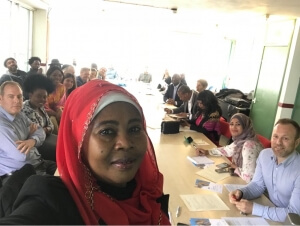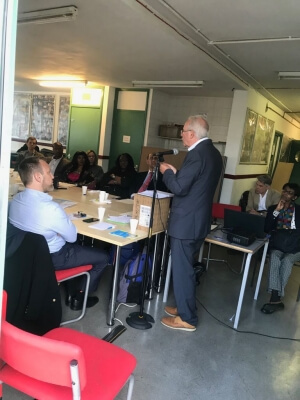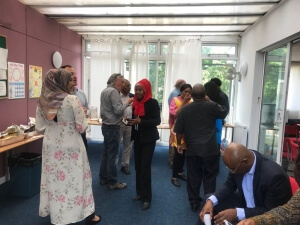By Talia Smith
Talia Smith
On 9 May 2018 representatives of numerous organisations gathered at the heart of Islington’s most diverse community as part of the Sustainable Communities National network meeting, in collaboration with Take 1 Step and Light Project Pro International where the event was held. Over 50 people from diverse backgrounds, ages and faiths gathered for a thought provoking and inspiring day. With political extremism and gang crime being on the rise across our nation, distinguished key people shed light on the subject.
Cllr Michelline Ngongo, Chair of Light Project Pro International – a community development and education provider for children and youth in Islington – set the agenda for the day in her welcome. ‘Together we can change the community – we each have a role and responsibility to do so’ she passionately stated.
Co- facilitator and Head of the Sustainable Communities programme, Amina Khalid, reminded the audience that they were gathered for a common vision. ‘We are here because we all want to change the current narrative in our respective communities. We are each of us are part of a bigger picture’.
Paul Gutteridge a Behaviour Analyst and Founder of Take 1 Step, an independent peace building and diplomatic organisation working in sensitive contexts, co-facilitated the day.
The morning session was addressed Chief Superintendent David Smart, Head of Prevent at New Scotland Yard. It was a unique opportunity to engage in an honest discreet conversation between police, policy makers, politicians, special advisers and community activists working on the ground with a key focus on trustbuilding under the theme of ‘What does it take to build trust in our community?’ This was followed by a lively discussion on ‘what does it take to reduce violence on our streets?’
The purpose of the day was to have an honest conversation between the police and community representatives, with a focus on trustbuilding.
We explored the impact of knife crime on our communities. It started with speaker Mark Prince, former professional boxer and founder of Kiyan Prince Foundation (KPF) which uses life coaching and sports to empower young people to create thriving communities and a violent free society.



Mark told his story about losing his son, Kiyan Prince, tragically and unnecessarily to a knife incident that took place outside his school in North London. ‘You have to decide how to deal with grief. I chose the route of faith over revenge.’ From this, Mark became the ‘accidental’ figurehead and a high-profile spokesman in the fight against knife and gun crime in the UK. Homeless at 15, two children by 21 and on the road to imprisonment after a life of criminal activity, Mark found his escape through boxing. Fast forward another two years and with a new focus on hard work and training, he turned professional. He had 19 wins and 1 loss before his career came to an abrupt end.
Mark established the KPF foundation in 2008. Her offers authentic, real-world advice through sharing his life story, and genuine ways on how to get out of the situation so many young people find themselves in. ‘After all, it’s not your circumstances that dictate your future but how you deal with it,’ commented Mark. He is calling everyone to ‘take responsibility for peace on our streets and use what we have – money, influence, networks, etc – to make a change.’ Mark has written a book ‘The Prince of Peace’ – a story of his life, and of pain and hope.
Ian Monteague, Chair of Family Action In Rogerfield and Easterhouse (FARE) also spoke. FARE is a community charity set-up in 1989 and based in one of Glasgow’s toughest areas. It has a turnover of £1.1 million. He has lived and worked in Easterhouse for most of his life, and knows the challenges of gang culture and the crippling impact of ‘social discontent.’
‘I believe things can be better. We are all working towards a renewal, making change a reality’. FARE works to ‘close the gap’ between children, parents, police, politics. ‘We looked at where change needs to happen and focused on those sectors. We have programmes in primary schools and targeting those at high risk.’
Ian gave practical advice how to close the gaps in our communities ‘choose three key people in your community and get in touch with them, it could be your MP, a faith leader, police chief, etc. Reach out and build relationships with these people, this will develop your circle of influence so you can be a central connector. Who is socially isolated in your community? Reach out to them as well; show up to close the gap.’
Ian encouraged the audience to develop your own manifesto. ‘Write: My hope is …… My desire is ……. My dream is. This is your verbal declaration of your intentions and motives for change.’
Next steps?
The discussion that followed centred around the importance of trust and the need to restore it. The importance of community and collaboration was stressed, and we hope to have relevant representatives in the next meeting. As well as change at a structural level, it was stated that we need to start at a personal level, with family structures and role models in the community, and the provision of employment and training opportunities for young people. In our follow up meetings we will explore how to build trust, share experiences, explore solutions such as community led grassroots solutions and connect further.